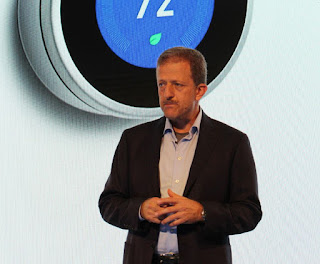Five months after Nest rejoined Google,
the search giant told employees Tuesday that Marwan Fawaz will no
longer be CEO of Nest, and the smart home device maker will be combined
with Google's home and living room products team.
The
move may make it easier for Google's smart home devices to work with
each other and tap into artificial intelligence and machine learning
advances, Fawaz and Rishi Chandra, vice president of product management
for Google's home and living room products, said in a joint interview on
Monday.
"This is the natural evolution," Chandra said. "We thought, let's connect these things and build experiences that we really couldn't do before."
For consumers, those connected "experiences" could involve Nest's web-connected thermostat, smoke alarm and home security system, as well as Google Home smart speakers and Chromecast streaming devices.
Fawaz will remain with Google and parent company Alphabet as an executive adviser. He said there would be no layoffs, and that Google is looking to expand the team. Google will also keep the Nest brand, Fawaz said.
It's the latest switch-up at Nest, which was started by former Apple hardware guru Tony Fadell and bought by Google for $3.2 billion in 2014. Alphabet folded Nest back into Google in February after letting it operate for three years as a semi-independent subsidiary of Alphabet. Those subsidiaries, which show up on Alphabet's balance sheet as "other bets," also include self-driving car company Waymo and the investment arm GV.
Google hardware chief Rick Osterloh said the change was "right for our users and the business."
"Marwan led the integration planning efforts and was responsible for determining our organizational strategy, in consultation with me, Rishi and our employees," he said in a statement. "We decided together to make these changes so we can better serve our users."
Google issued a statement late defending Fawaz as a "strong CEO" who was responsible for determining the organizational strategy.
"Nest's employee retention and satisfaction has significantly improved over his time with the team," Osterloh said in a statement discussing Fawaz's tenure. "Unsourced comments suggesting otherwise are wrong. I am pleased to report that he will stay with us as an executive advisor for our hardware business, for Alphabet companies, and future strategic investments."
Fawaz's exit from Nest comes after employees began pushing for a leadership change amid complaints that he's more of an operations manager than a leader, according to multiple sources including former Nest employees. They asked not to be identified because they weren't authorized to comment on behalf of Alphabet and Google.
Even before Google announced the leadership change Tuesday, Nest employees said they had the sense the reins would be handed over to Chandra if Fawaz stepped aside. They applauded the change.
One longtime Nest employee said, "I'm happy to leave Nest in Rishi's hands."
'The new normal'
Fawaz, a former Motorola executive who joined Google in 2016, took over as CEO immediately after Fadell stepped down. Former employees said there was a disconnect from the start with Fawaz, who was handpicked by Alphabet's board.They described him as the exact opposite -- likely by design -- from his predecessor.
Employees viewed Fadell -- who's known as the godfather of the iPod and played a key role in designing the iPhone -- as a product visionary and leader. Fawaz, by contrast, was considered a business development manager, focused on efficiencies.
Read More at: https://www.cnet.com/news/nest-ceo-steps-down-after-employees-pushed-for-his-exit/

Comments
Post a Comment